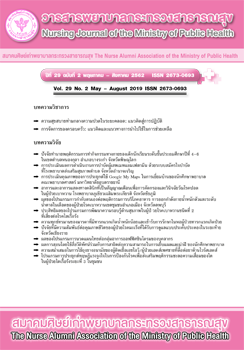Suffering of the Mothers with Low Birth Weight Infants Hospitalized in Sick Newborn Care Unit Suffering of the Mothers with Low Birth Weight Infants Hospitalized in Sick Newborn Care Unit
Main Article Content
Abstract
This qualitative research study aimed to explore the suffering of mothers who gave birth to low birth weight infants. The participants consisted of 24 mothers with low birth weight infants who were hospitalized in newborn care units at regional public hospitals in Eastern Thailand. An in-depth interview with open-ended questions was used to collect data. Qualitative content analysis was conducted for data analysis. The findings revealed 5 themes of mother’s suffering including, 1) mother’s suffering characteristics: anxiety/stress, sadness, sleeplessness, and no appetite; 2) causes of mothers’ suffering: fear of complications and death of infants; 3) factors affecting mothers’ suffering: the health condition of infants, and family support, 4) the means to reduce suffering: creating hope, making merit, praying, and accepting the infant’s condition; and 5) outcomes of reducing suffering: living with suffering, reduced suffering, and having hope. The findings enhance understanding about mother’s suffering. Nurses or other health care providers could develop nursing interventions for reducing suffering based on these findings.
Article Details
บทความและรายงานวิจัยในวารสารพยาบาลกระทรวงสาธารณสุข เป็นความคิดเห็นของ ผู้เขียน มิใช่ของคณะผู้จัดทำ และมิใช่ความรับผิดชอบของสมาคมศิษย์เก่าพยาบาลกระทรวงสาธารณสุข ซึ่งสามารถนำไปอ้างอิงได้
References
2. Brett J, Staniszewska S, Newburn M, Jones N, Taylor, L. A systematic mapping review of effective interventions for communicating with, supporting and providing information to parents of preterm infants. British Medical Journal 2011; 1(1): 1-11.
3. Schappin R, Wijnroks L, Venema, M, Jongmans M. Rethinking stress in parents of preterm infants: a meta-analysis. [Internet].2013 [cited 2018/05/20]. Available from: https://journals.plos.org/plosone/article?id=10.1371/journal.pone.0054992
4. Swartz M. Parenting preterm infants: A meta-synthesis. American Journal of Maternal Child Nursing 2005; 30(2): 115-20. .
5. Hutchinson SW, Spillet MA, Cronin M. Parents’ experiences during their infant’s transition from neonatal intensive care unit to home: A qualitative study. The Qualitative Report 2012; 17(23):1-20.
6. Hummel P. Parenting the high-risk infant. Newborn and Infant nursing Review 2003; 3(3): 88-92.
7. Whitfield MF. Psychosocial effects of intensive care on infant and families after discharge. Seminars in Neonatology 2003; 8(2):185-93.
8. Vélez MC, Palacio C, Moreno AI, Krikorian A. Psychological and family-related facts of suffering in patients with chronic diseases. Techniques in Regional Anesthesia and Pain Management 2013; 17(1): 7-10.
9. Ponte PR. Distress in cancer patients and primary nurses’ empathy skills. Cancer Nursing 1992; 15(4): 283-92.
10. Wright LM. Spirituality, Suffering, and Illness Ideal for Healing. Philadelphia: F.A. Davis Company; 2005.
11. Krikorian A, Limonero JT, Mate J. Suffering and distress at the end of life. Psychology-Oncology 2012; 21: 799-808.
12. Hinds C. Suffering: A relatively unexplored phenomenon among family caregivers of non-institutionalized patients with cancer. Journal of Advanced Nursing 1992; 17(8): 918-25.
13. Seyama R, Kanda K. Suffering among the families of cancer patients: concept analysis. Kitakanto Medicine Journal 2008; 58: 71-6.
14. Abraham A, Kutner JS, Beaty B. Suffering at the end of life in the setting of low physical symptom distress. Journal of Palliative Medicine 2006; 9(3): 658-65.
15. Rodgers BL, Cowles KV. A conceptual foundation for human suffering in nursing care and research. Journal of Advanced Nursing 1997; 25(5): 1048-53.
16. Miles MS, Holditch-Davis D. Parenting the prematurely born child: Pathways of influence. Seminar in Perinatology 1997; 21(3): 254-66.
17. Wereszczak J, Miles S. Holditch-Davis D. Maternal recall of the neonatal intensive care unit. Neonatal Network 1997;16(4):33-40.
18. Muller-Nix C, Forcada-Guex M, Pierrehumbert B, Jaunin L, Borghini A, Ansermet F. Prematurity maternal stress and mother-child interaction. Early Human Development 2004; 79:145-58.
19. Pesonen AK, Raikkonen K, Strandberg TE, Jarvenpaa AL. Continuity of maternal stress from the pre-to postnatal period: Associations with infant’s positive, negative and overall temperamental reactivity. Infant Behavior and Development 2005; 28(1): 36-47.
20. Othman A, Mohamad N, Hussin ZA, Blunden S. Psychological distress and associated factors in parents of children with cancer. International Journal of Social Science and Humanity 2011; 1(1): 37-42.
21. Hsieh HF, Shannon S. Three approaches to qualitative content analysis. Qualitative Health Research 2005; 15:1277-88.
22. Lincoln YS, Guba EG. Naturalistic inquiry, Philadelphia: Sage Publications; 1985.
23. McCorkle R, Young K. Development of a symptom distress scale. Cancer Nursing 1987; 1(11): 373-78.
24. Hockenbery MJ, Wilson D. Wong’s nursing care of infants and children. 10th ed. St. Louis: Mosby: 2015. [Internet]. 2015 [cited 2016 January 6,]: Available from: http://www.pubmed.gov
25. Ionio C, Colombo C, Mascheroni V, Confalonieri E, Castoldi E, Lista G..Mothers and Fathers in NICU: The Impact of preterm birth on parental distress. Eur J Psychol 2016; 12(4): 604–21.
26. Holditch-Davis D, Miles MS. Mothers’ stories about their experiences in the neonatal intensive care unit. Neonatal Network 2000; 19(3): 13-21.
27. Thomas KA, Renaud MT, Depaul D. Use of the parenting stress index in mothers of preterm infants. Advance Neonatal Care 2004; 4(1): 33-41.
28. Krikorian A, Limonero JT, Mate J. Suffering and distress at the end of life. Psychology-Oncology 2012; 21: 799-808.
29. Ramos FP, Enumo SR, Paula KM. Maternal coping with baby hospitalization at a neonatal intensive care unit. Paidéia 2017; 27(67): 10-9.
30. Puntillo KA, Waters MA. Commentary on parent-to-parent support initiated in the neonatal intensive care unit. AACN Nursing Scan in Critical Care 1996; 6(3):24-5.
31. Pathom-Aree N, Yenbut J, Urharmnuay M. Maternal participant in caring for newborns in NICU. Chiang Mai University Journal of Natural Sciences 2010; 9(2): 231-44. (in Thai)
32. Pukahuta P, Phutthikhamin T. The effects of therapeutic prayer on anxiety and spiritual well-being in breast cancer patients in diagnostic phase. Journal of Nurses’ Association of Thailand, North-Eastern Division 2012; 30(2): 122-30.

